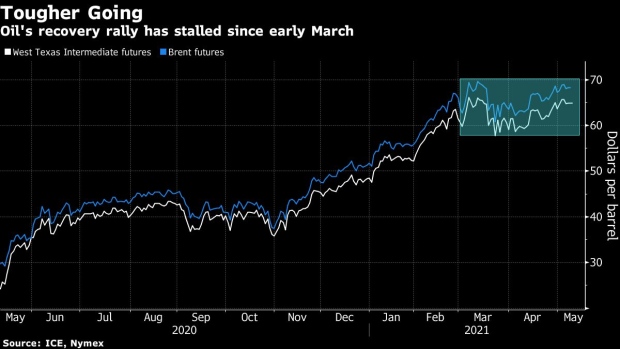May 11, 2021
Oil edges higher with weak dollar offsetting refiner run cuts
, Bloomberg News
Gas will continue to outpace crude with Colonial Pipeline cyberattack fuelling gain: KKM Financial
Oil rose as a weaker dollar lent support and offset a burgeoning pile up of crude in the U.S. Gulf Coast as refineries there cut runs in response to the Colonial Pipeline shutdown.
Crude futures in New York rose less than 1 per cent Tuesday. The dollar has traded steadily weaker, making commodities priced in the currency more attractive.
Colonial Pipeline Co. is working to restart its oil-products system, the largest in the U.S., after a cyberattack shuttered operations. While gasoline stations from Alabama to Virgina report shortages, refiners in the U.S. Gulf are reducing output to avoid a glut in the absence of the pipeline. Some refiners have already chartered ships to store refined products offshore.
“The dollar index trading lower explains the slight increase in oil prices,” said Bob Yawger, head of the futures division at Mizuho Securities. The weak dollar may have saved the day for crude oil, which was facing pressure from refiners being forced to store barrels they can’t feed into the pipeline, he said.

U.S. crude oil prices are up 2.7 per cent so far this month even with coronavirus-induced demand concerns, particularly in India, limiting rallies. Still, the Organization of Petroleum Exporting Countries on Tuesday lifted its forecast for the amount of crude it will need to produce and the group now sees a small decline in U.S. supplies this year, mostly due to the Texas freeze in February.
Traders are expecting “a gradual resolution to the Colonial Pipeline shutdown,” according to Louise Dickson, an analyst at consultant Rystad Energy. “The market is again looking to Asia, COVID-19 cases, and the next signals for oil demand outlook.”
Prices:
- West Texas Intermediate for June delivery rose 36 cents to settle at US$65.28 a barrel in New York
- Brent for July settlement gained 23 cents to end the session at US$68.55 a barrel
- U.S. gasoline futures rose 0.3 per cent to settle at US$2.1399 a gallon
Meanwhile, the knock on impact of the Colonial disruption is rippling through to everything from refining to shipping. Among processors, Total SE scaled back activity in a key unit at its Port Arthur, Texas, refinery, and Citgo Petroleum Corp. also cut rates at its Lake Charles, Louisiana, plant. There’s been a rush to book oil tankers as traders seek to redress the supply imbalance caused by the stoppage.
“We are far from out of the out of the woods with the Colonial situation,” said Kilduff. “A scare among consumers is increasingly likely, where a run on gas stations may develop more broadly, especially if there is no resolution by the end of the week.”
The U.S. East Coast has lost about 3.6 million barrels of gasoline supply due to the Colonial Pipeline disruption, with the region losing an additional 1.2 million barrels each day the outage continues, according to FGE.
In the U.S., crude supplies are expected to have dropped last week, according to a Bloomberg survey. The industry-funded American Petroleum Institute will report its supply tally later Tuesday, while government data will be released on Wednesday.
Related coverage:
- Saudi Aramco gave full contractual supplies to at least two buyers in Asia for June-loading cargoes, according to refinery officials.
- Petroleos Mexicanos is racking up millions of dollars in late payments to oil companies as it struggles to generate cash amid skyrocketing debt and weaker crude sales.
- British insurer Legal & General Group Plc became the largest-yet Exxon Mobil Corp. investor to support an activist campaign to overhaul the oil giant’s board and make its climate goals more ambitious.
- Despite making new pledges to eliminate their net carbon emissions by 2050, the annual shareholder meetings of Europe’s oil companies are once again being dominated by clashes with environmental groups.





